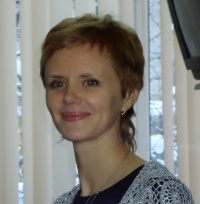CAZypedia celebrates the life of Senior Curator Emeritus Harry Gilbert, a true giant in the field, who passed away in September 2025.
CAZypedia needs your help!
We have many unassigned pages in need of Authors and Responsible Curators. See a page that's out-of-date and just needs a touch-up? - You are also welcome to become a CAZypedian. Here's how.
Scientists at all career stages, including students, are welcome to contribute.
Learn more about CAZypedia's misson here and in this article. Totally new to the CAZy classification? Read this first.
Difference between revisions of "User:Anna Kulminskaya"
Harry Brumer (talk | contribs) m |
Harry Brumer (talk | contribs) m |
||
| (2 intermediate revisions by one other user not shown) | |||
| Line 1: | Line 1: | ||
| + | [[Image:AKulminskaya.jpg|200 px|right]] | ||
I’m a research scientist at the Petersburg Nuclear Physics Institute, Molecular and Radiation Biophysics Department, Russia. I received my PhD degree under supervision of Neustroev Kirill studying the exo-inulinase from ''Aspergillus awamori'' ([[GH32]]). Now I’m a leader of the Laboratory of Enzymology at the same Institute. | I’m a research scientist at the Petersburg Nuclear Physics Institute, Molecular and Radiation Biophysics Department, Russia. I received my PhD degree under supervision of Neustroev Kirill studying the exo-inulinase from ''Aspergillus awamori'' ([[GH32]]). Now I’m a leader of the Laboratory of Enzymology at the same Institute. | ||
Latest revision as of 05:23, 2 March 2011
I’m a research scientist at the Petersburg Nuclear Physics Institute, Molecular and Radiation Biophysics Department, Russia. I received my PhD degree under supervision of Neustroev Kirill studying the exo-inulinase from Aspergillus awamori (GH32). Now I’m a leader of the Laboratory of Enzymology at the same Institute.
The main research area of our team is carbohydrate enzymology and applications. We focus in understanding the way in which particular enzymes act to alter the structure of poly- or oligosaccharides found in Nature, and to harness these enzymes for practical applications. Using the tools of chemo-organic synthesis and biochemistry, our work aims to provide increased understanding of the chemical principles underlying mechanisms of action of glycoside hydrolases with transglycosylating activity.
We are particularly interested in the alpha-galactosidases (GH27 and GH36), beta-galactosidase (GH35), beta-xylosidases (GH3), beta-xylanases, cellulose-degrading enzymes, alpha- or beta-mannosidases (GH2) and alpha-L-fucosidases.
